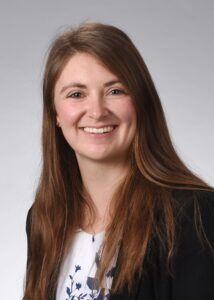Nov. 8 is National First-Generation Day, a time to recognize the challenges and celebrate the successes of first-generation students, faculty and staff, or individuals whose parents did not receive a baccalaureate degree.
UW School of Medicine faculty, residents, fellows and students share what being first generation means to them.
Brayden Crowley, MS1
What does being a first-generation student mean to you?
Being a first-generation medical student just means that I am the first in my family to be navigating these intimidating uncharted waters. Coming from a blue-collar family in rural Montana, pursuing medicine seemed like such a long shot. Now that I finally am here in medical school, I think it’s pretty incredible to see how my efforts have gotten me to this point.
What are you most proud of from your time as a student so far?
I’m only three months into school at the time of writing this, and I am pretty proud of the balance that I have been able to find between academics, my social life and my personal health.
What do you want to share with other first-generation students?
Don’t let your background, upbringing or hardships hinder your progress. Instead, look to it for motivation.
Erica Crittendon, MS2
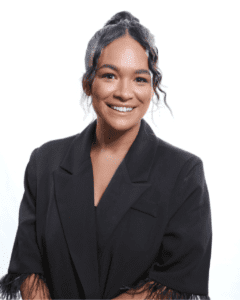
What does being a first-generation student mean to you?
I’m from Tacoma, Washington, and there aren’t many physicians from my neighborhood — or at least I didn’t personally know any growing up. My friends, family, extended family and members in my community have all been incredibly excited to see me on this journey. Sometimes it does feel overwhelming to feel like you have a responsibility to be this representative for first-generation students, but it brings me joy knowing that I am a role model who paves the way for others. Pursuing medicine as a first-generation student has been a unique, challenging, yet rewarding experience so far. It’s been beautiful to have the community support that I do.
What are you most proud of from your time as a student so far?
Every day I feel humbled that my classmates in Seattle elected me as their class president. Even more so, I am proud of what I’ve done with this position. Being in this role has been a challenge, but it has provided me with the opportunity to define my place in the School of Medicine during my time here. I am an advocate who cares deeply about her colleagues, her community and her future patients. I’m not entirely sure if there’s ever been a Black woman as class president at UW School of Medicine, but nevertheless, I’m honored to say that I’m one of them.
What do you want to share with other first-generation students?
Find community with other first-generation students. I’m only in my second year of medical school, but one of the biggest things I’ve learned is knowing that you can’t do this by yourself. The path to medicine takes a village; I learn so much from my peers and I am glad to have them in mine.
Hao Tong, Chief Resident, Internal Medicine
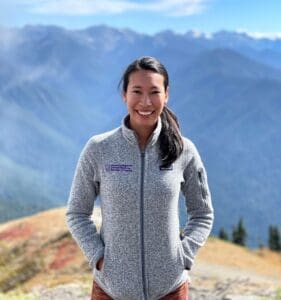
What does being a first-generation student mean to you?
My parents are post-war Vietnamese refugees who were separated for 10 years (father in the U.S. with my oldest brother, mother remained in Vietnam with my sister and younger brother) and finally reunited in Seattle where they had me. Being a first-generation student is not only a proud achievement for someone who grew up in a lower socioeconomic household, but a proud achievement for anyone who is coming from a marginalized community that has faced systemic barriers to higher education. I remember bouncing from elementary school to elementary school growing up as my parents sought out the best school districts to place me in hopes that I would be afforded better educational opportunities. I remember the worry that their own inability to help me with my schoolwork, both personally and financially, would be an impediment to my future. I remember watching them put in 14-hour days at our family convenience store, never having a vacation, and learning the importance of hard work and its complex relationship to the American Dream. And I remember the worries they had as I packed my bags to move cross country to obtain a master’s degree in hopes of strengthening my application for medical school, and the tears we all cried when I was accepted to the University of Washington School of Medicine. My personal achievement validates my parents’ sacrifice in fleeing their home and creates hope for others who envision a better future for their family.
What are you most proud of from your time as a resident so far?
I am most proud of my leadership activities that span from mentoring and guiding pre-medical undergraduate students through the medical school application process, creating a space for discussion of issues pertaining to equity, diversity and inclusion within medicine among my peers, and developing and incorporating a health equity lens into how we take care of our patients. Being chosen as one of the inpatient chief residents within the Internal Medicine program has been the culmination of my efforts and shows that academia values the stories and work of individuals like myself.
What do you want to share with other first-generation students?
There is no right path to getting to where you want to be and where you want to be may change during your journey to getting there — that is OK. Take the time to reflect on the decisions you make at every stage in your life and remember to do what feels right and is in line with what your values and beliefs are. Share your story with others and learn from those around you at the same time. Cherish those who support you along the way; it truly does take a village.
Jamie Ritter, MS2
What does being a first-generation student mean to you?
Being a first-generation student means I get to be a leader in my family and a positive role model for future first-generation students in my community.
What are you most proud of from your time as a student so far?
Simply surviving first year was a success. I am most proud of the mentorship work I have been able to do through the Hopa Mountain Medical Mentorship program and that I was able to maintain and foster experiences and relationships in and out of medicine.
What do you want to share with other first-generation students?
Success will not be easy, but you are capable of achieving anything you set your mind to. Grit, determination and follow through will get you to your goal even when the path is different than you planned. Keep showing up!
Johnnie Orozco, MD, PhD, Hematologist-Oncologist

What does being a first-generation faculty member mean to you?
Being a first-gen faculty member is a source of confidence now, a reminder that I’ve had to find innovative ways to “figure things out” to get to the next level, to get here. Whereas before the struggles with imposter syndrome from finding my way to academic medicine were at times paralyzing, now I use it as a constant reminder that I’ve got what it takes to get here, and that I do belong in this seat at the table. It’s also a reminder that I’m here because of the generosity of mentors along the way, and part of why I make myself available to other first gen students attempting to find their path. Perhaps most meaningful to me is that I get to contribute to the research agenda, by articulating science and research questions that merit investigation. Those questions come from a place of inclusivity, to expand the potential impact and benefits of our research in a more equitable and fair manner.
What are you most proud of from your time as faculty so far?
By far I most value meeting other first gen students and brainstorming with them potential paths they may take as they articulate their passion and goals. Part of it may be sharing my story, so that we all accept that there is no “one path” to a particular career. A large part is listening and being inspired by their journey thus far and filling in ideas for next steps. The excitement when they get into medical or graduate school or their training program of choice is unparalleled and a big reason why I make mentoring an important part of my faculty duties.
What do you want to share with other first-generation students and faculty?
It’s been an amazing journey as a first gen undergrad, graduate, medical student, resident, fellow and now faculty. From this perspective there are so many things that are taken for granted by folks from majority backgrounds, and the rest of us have had to “hustle to figure it out.” Sometimes I need to point those out and give a different perspective. More importantly, this resilient ingenuity we’ve had to develop has given many of us a well-developed sense of creativity to problem-solve, navigate and execute. I would hope that other first gen students focus on that interpretation of our unique journeys and use it as a source of motivation and confidence. Those skills are bound to make important contributions and impacts in any field!
Justin Lo, MS1
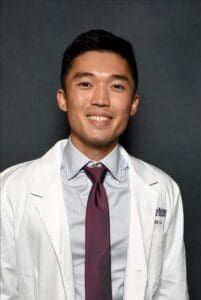
What does being a first-generation student mean to you?
Being a first gen student reminds me that the opportunities I have are the fruits of my family’s labor. It motivates me to continue working hard and to appreciate the journey ahead of me. When medical school and life get overwhelming, I try to be kind to myself and lean on the support systems I have around me.
What are you most proud of from your time as a student so far?
Getting into UW School of Medicine!
What do you want to share with other first-generation students?
UW is an incredible community with many wonderful mentors willing to help. Reach out to faculty who share similar interests and take advantage of UW’s wide network.
Sheva Mozafari, MS2

What does being a first gen student mean to you?
Being a first gen med student and American means so many different things to me. It has been really challenging at times; it often feels like there are so many things I am supposed to be doing, but I didn’t have anyone to tell me about the unspoken expectations. It can make you feel like you’re one step behind. However, I have surprisingly found a lot of peace in the challenge that comes with being first-generation. I have found community with those who are in the same shoes I am, and I have found out more about myself than I thought possible. I now know my strength, perseverance and willingness to overcome adversity. So, for me, it is incredibly meaningful to know what I am capable of and to hopefully empower those who come after me that they can do it too. To me, it also means liberation. I am Iranian American. My parents were both born and raised in Iran and emigrated to the U.S. in order for their kids to have a better shot at being able to get an education. My mom was denied those opportunities and forced to live life a way that she didn’t want for me or any of her kids. The protests going on today in light of Mahsa Amini’s murder are in regard to the same fight she was fighting before she came to America. I feel incredibly blessed to have been raised by such a strong woman; she wanted a better future for me and showed me what it means to fight for what you want.
What are you most proud of from your time as a student so far?
I think the thing I am most proud of so far is how I have chosen to use my voice. As an undergrad, the governor of Utah selected me to serve as the student regent for the state of Utah, representing nearly 200,000 higher ed students in the state on the board of regents. I advocated for student-friendly policies and the affordability and inclusivity of higher ed. I feel that at the University of Washington, I have done similar work. I serve as a wellness representative for our med school class, a premed mentor, I am a student on the search committee for the new Associate Dean of Student Affairs, and I am an Area Health Education Center (AHEC) scholar. No matter the situation I am in, I feel proud that I always try to use my voice to advocate for others to hopefully make their path less challenging than it was for me. I recognize the privilege I hold to be in medical school and to be obtaining a higher education and I don’t want to take that for granted.
What do you want to share with other first-generation students?
I would encourage first-gen students to get involved as much as possible. Your voice matters. Be loud and proud and advocate for ways to make these systems more accessible for people like us. Nothing changes when we are silent!
Sofia Jaramillo Q., MD, Geriatrics Fellow
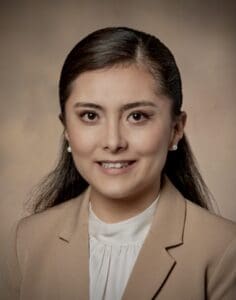
What does being a first-generation fellow mean to you?
Being a first-generation physician is a privilege. Both my parents come from humble backgrounds. They make me realize how fortunate I am every day. The possibility of achieving the highest level of education and more so outside of my home country is the result of a family endeavor. Access to education is a luxury that has allowed me to have perspective and appreciate my privileged position. I use it to help the less fortunate every day.
What are you most proud of from your time as a fellow so far?
I am very proud of my day-to-day life activities in general. As a Geriatrics fellow, I can help an especially vulnerable subgroup, our older adults. By helping them, I can spread the word about evidence-based and cost-effective practices across our inter/multidisciplinary teams. I also model the behavior of the next generations of physicians. Moreover, I educate caregivers and families about preventive medicine and care. I also benefit from my colleagues’ expertise with new learnings every day. Geriatrics is an all-in-one job.
What do you want to share with other first-generation students?
I hope all people who share my privilege can become advocates to recruit more people into our medical field. We are living through a post-pandemic crisis. At baseline, we needed more people to join our medical teams. After this period in history, we are falling further behind. The medical field benefits from including individuals of all sex, racial, ethnic, religious, socioeconomic and cultural backgrounds. Their unique perspective and life experience help improve our field by providing representation.
Ysabella Raceli D. Rivera, MS1

Ysabella (center) and her parents Rocellie Rivera (left) and Nony Rivera (right) at the E22 Spokane White Coat Ceremony on Sept. 9, 2022.
What does being a first-generation student mean to you?
Being a first-generation medical student means many things to me. But if I had to choose one, it means creating a new trail and leaving a path behind for others. My mom and dad both immigrated from the Philippines and have done everything they can to support my dreams. Every single hobby I had, whether it be diving, figure skating or even archery, they had my back. I certainly would not be here at UW School of Medicine without them, and my successes are just as much theirs. Growing up, I didn’t know anyone in the medical field. I had no clue what the journey was going to be like and it was a challenge from the start. Luckily enough, I found a great support network of mentors and peers within UW, and with persistence and resilience, I found my way. Now with the privilege of being able to look back on this journey, I feel so grateful to have made it this far. Knowing how hard the road to medicine is, especially for first-generation students, I make a conscious effort to be there for them. Whether it is sharing free resources, finding time to FaceTime or grabbing coffee with students, I hope to make their journey just a little easier.
What are you most proud of from your time as a student so far?
What I am most proud of from my time as a student are all the connections I have made. Networking as a young adult is no easy task. As a bright-eyed college student, it can be intimidating to reach out to professionals. What I’ve learned is the worst thing that can happen is dismissal or no response at all. And yes, rejection sucks. But you’ll never find new opportunities unless you put yourself out there! I must have sent hundreds of emails throughout undergrad, but every single one was worth it. I am proud that I learned to not be afraid of rejection, and I am so grateful to have the network of mentors and colleagues I have today.
What do you want to share with other first-generation students?
“Do not sell yourself short,” is what my dad would always tell me growing up. There were more times than I can count that I almost gave up on my dream of becoming a physician because I didn’t think I could make it. My college transcript was surely nowhere near perfect, and I surely never felt like the smartest person in the room. And it’s OK to feel like that sometimes. But what isn’t OK is taking that feeling and allowing it to limit your potential. Although I’m sure you’ve heard this before, I can’t help but reiterate that your failures do not take away from your success. I believe it is building resilience after your failures that is the real secret of success, no matter what it is you want to accomplish. Every single one of your experiences is a part of your story. Don’t sell yourself short just because of one bad day.
Editor’s note: Responses were lightly edited for length, clarity and style.

